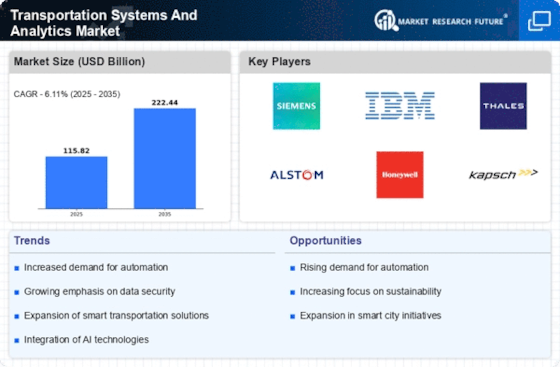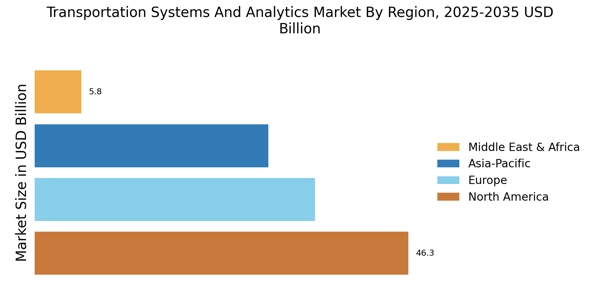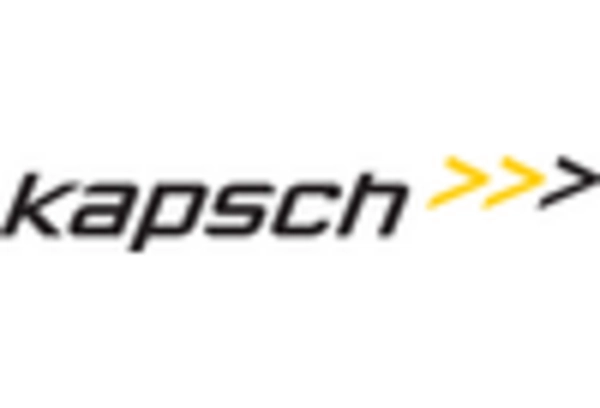Emergence of Smart Cities
The rise of smart cities is a pivotal driver for the Transportation Systems And Analytics Market. As urban areas evolve to incorporate advanced technologies, the need for sophisticated transportation analytics becomes paramount. Smart cities leverage data from various sources, including IoT devices and sensors, to enhance urban mobility and reduce congestion. It is estimated that the smart city market will reach $2.5 trillion by 2025, with transportation analytics playing a crucial role in this transformation. By utilizing analytics, city planners can optimize public transport routes, improve traffic management, and enhance overall urban mobility. This trend not only fosters economic growth but also contributes to environmental sustainability, thereby propelling the Transportation Systems And Analytics Market.
Growing Focus on Sustainability
Sustainability has emerged as a critical focus within the Transportation Systems And Analytics Market. As environmental concerns escalate, transportation companies are increasingly adopting analytics solutions to minimize their carbon footprint and enhance operational efficiency. The market for sustainable transportation analytics is projected to grow significantly, with estimates suggesting a potential increase of 20% in the next few years. Companies are utilizing analytics to assess emissions, optimize fuel consumption, and implement eco-friendly practices. This shift towards sustainability not only aligns with regulatory requirements but also meets the expectations of environmentally conscious consumers, thereby driving demand for innovative analytics solutions in the transportation sector.
Government Initiatives and Funding
Government initiatives aimed at improving transportation infrastructure and systems are significantly influencing the Transportation Systems And Analytics Market. Various governments are investing heavily in smart transportation solutions, with funding allocated for research and development in analytics technologies. For instance, recent reports indicate that public sector investments in transportation analytics could exceed $10 billion by 2026. These initiatives not only enhance the efficiency of transportation networks but also promote sustainability and safety. As governments prioritize the modernization of transportation systems, the demand for analytics solutions that can provide actionable insights into traffic patterns, safety measures, and environmental impacts is likely to increase, further driving the market.
Advancements in Technology and Connectivity
Technological advancements and enhanced connectivity are reshaping the Transportation Systems And Analytics Market. The proliferation of mobile devices, cloud computing, and big data analytics is enabling transportation companies to harness vast amounts of data for improved decision-making. Recent studies indicate that the integration of advanced technologies in transportation analytics could lead to a 30% reduction in operational costs. As companies adopt these technologies, they can gain insights into customer behavior, optimize logistics, and enhance service delivery. The ongoing evolution of technology is likely to continue influencing the market, as organizations seek to leverage analytics for competitive advantage in an increasingly complex transportation landscape.
Increased Demand for Data-Driven Decision Making
The Transportation Systems And Analytics Market is experiencing a surge in demand for data-driven decision-making processes. Organizations are increasingly recognizing the value of analytics in optimizing transportation operations, enhancing efficiency, and reducing costs. According to recent estimates, the market for transportation analytics is projected to grow at a compound annual growth rate of approximately 15% over the next five years. This growth is driven by the need for real-time data insights, which enable companies to make informed decisions regarding route optimization, fleet management, and resource allocation. As businesses strive to improve operational performance, the integration of advanced analytics tools becomes essential, thereby propelling the Transportation Systems And Analytics Market forward.

















